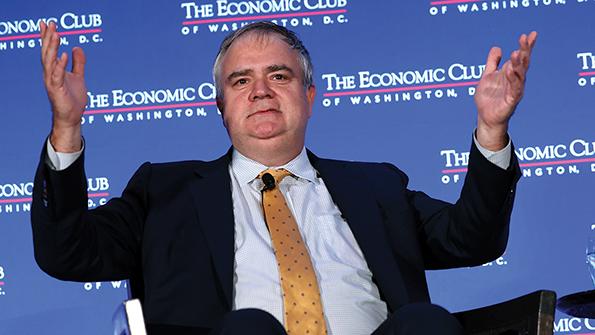
If there was an award for most embattled airline CEO of the year, JetBlue’s Robin Hayes would be a clear frontrunner.
As of mid-March, Hayes and his legal team were in the probably unprecedented situation of doing a double battle with the U.S. Department of Justice (DOJ). Last year, DOJ sued to dissolve JetBlue’s Northeast Alliance with American Airlines, arguing the partnership is anticompetitive despite it having been approved under the previous Trump administration.
Then came another bombshell. DOJ, with the support of the Department of Transportation, lobbed a second lawsuit at JetBlue, this time against its proposed acquisition and merger with Florida-based ultra-LCC Spirit Airlines. Again, DOJ’s argument is that the merger would be anticompetitive.
In remarks during a speech in Washington soon after the lawsuit was announced, U.S. associate attorney general Vanita Gupta said DOJ’s complaint alleges that JetBlue’s acquisition of Spirit “would particularly hurt those travelers who can least afford to see travel costs rise.”
The merger would lead to fewer seats and higher prices for travelers, Gupta said, as well as heighten the risk that remaining airlines would coordinate to raise prices. In words clearly meant to align with President Joe Biden’s blue collar, “man of the people” image, Gupta added: “Threats to competition like those alleged here are particularly likely to harm working- and middle-class families, who may struggle to withstand the price increases that consolidation often brings. … Keeping the economy open to all Americans, regardless of income status, is a priority across the department.”
There’s a curious irony and lack of knowledge of recent U.S. airline history to such statements. JetBlue, founded in 2000 and based at New York JFK, introduced low fares and high customer service into a region of the U.S.—the Northeast—where fares had consistently been among the highest and service was often an afterthought. In addition to offering alternative flights on some of the most lucrative business routes between New York, Washington, DC and Boston, JetBlue gave tourists, fun seekers and families new low-cost options between the U.S. Northeast, Florida and the Caribbean, creating what essentially became mini-hubs in Fort Lauderdale, Orlando and Puerto Rico. Until then, almost all those north-south routes—and fare offers—went via Miami and onboard American Airlines.
And JetBlue offered its “working class” flights with “upscale” style. Complimentary snack baskets that included the famous and quality blue potato chips; free Wi-Fi at every seat with multiple channels of entertainment for every passenger; leather seats with generous legroom that rivaled or bested the first-class cabins of some of the US majors. When JetBlue introduced nonstop transcontinental flights between popular cities like New York and San Francisco, fares in those markets dropped. And some long-time business frequent flyers with the likes of American and United Airlines switched to JetBlue on those routes after it created a Mint-branded premium cabin with privacy walls, lie-flat seats, and fine dining—something most of the majors were not even offering within the U.S.
Far from “harming” working- and middle-class families, it could be argued that JetBlue was a pioneer in making a “first-class” air travel experience affordable to the American Joe.
Hayes made clear before the DOJ’s announcement that the company would take the matter to court if necessary.
“A bigger JetBlue, taking the best of JetBlue with the best of Spirit, will allow this airline to grow to 8-9%. ... We’re going to make the industry much more competitive,” he told an audience in DC.
JetBlue’s problem is not that it’s anticompetitive or anti the working man. It’s a problem of timing. In 2021, before Denver-based ultra-LCC Frontier Airlines announced its intent to acquire Spirit, which prompted JetBlue’s $3.8 billion challenge, Biden issued an executive order entitled Promoting Competition in the American Economy.
From there on, the political tide turned for airlines, which Congress loves to knock as customer-scamming, penny-pinching, knee-crunching bad boys. By that time also, airline consolidation among the majors—much of it prompted by bankruptcies or financial mismanagement—was in the distant past and could not be unwound. Which is a good thing because US domestic fares, adjusted for inflation, continued to fall. But the four consolidated airlines hold 80% of the US domestic market.
To grow and meaningfully compete, those left in the 20% shadow need scale and broader network reach. Which is why Alaska Airlines and JetBlue fought bitterly to acquire west coast-based Virgin America (Alaska won), and Frontier and JetBlue went head-to-head for Spirit.
Ultimately, a JetBlue-Spirit merger would be good for competition and customer service, most especially for the working-class sector that the Biden administration seems so anxious to see fly. But proving that in court will come with legal costs that will pile on top of that $3.8 billion acquisition deal. It will also push out the timelines when the benefits of the merger can be realized. And it may require some painful give-ups or trade-offs across either or both of JetBlue’s alliance with American and the merger with Spirit, such as relinquishing of slots.
Hayes and his team had better have a good stock of blue chips at hand to sustain them through some very long nights.
